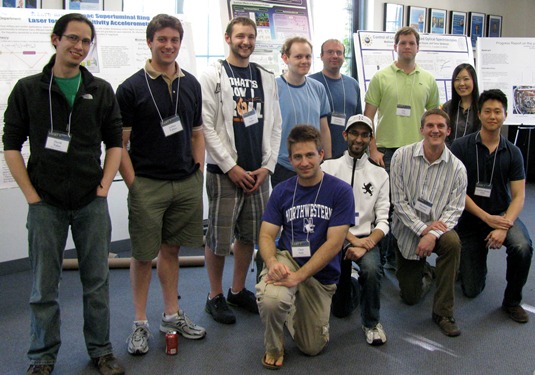Introduction
Northwestern University has received an IGERT (Integrative Graduate Education and Research Traineeship) program grant from the NSF to establish and IGERT MS/PhD program in science and technology surrounding quantum coherent optical and matter systems and related photonic structures and sources. Such studies intimately relate to the emerging field of quantum information processing.
The proposed work is organized into three sub-themes:
- Quantum Coherent Matter: Atoms, Molecules and Excitons
- Photonic Sources and Structures
- Quantum Optical Communications
Important objectives of the proposed IGERT include training more under-represented and women engineers and scientists, and producing a different kind professional worker, one who is cross-trained, flexible, and better prepared for the evolving needs of information technology.
From an earlier (1997) integrated (research with teaching) Master's program at Northwestern, it was learned that such a program was very attractive to talented underrepresented and female students who might not have enough confidence to enroll at a highly ranked research university. By giving them an opportunity, it helped them to develop self-confidence and thereby guide their career paths. Based on this prior experience, plans are proposed to recruit underrepresented students with leadership capabilities to the MS/PhD program. In turn, these trained leaders will train others, thus building capacity.
The participating Faculty Advisors are from four departments: Chemistry, Electrical and Computer Engineering, Materials Science and Engineering, and Physics and Astronomy. Mutual collaborations among the faculty advisors are already in place and are expected to be enhanced by the proposed effort. A central feature of this IGERT is that the participating students take courses in at least three of the departments. Furthermore, due to the advanced nature of the research topics selected, major segments of the required theory and practice are not presently being taught and the faculty advisors have volunteered to create new courses, which fill in the gaps.
An external review board will be assembled each year to critique the program and assess its progress and, when possible, their suggestions will be implemented. The program will include: an external speaker/visitor series, a student seminar series, an annual internal workshop (including exploration of ethics issues), and an annual scientific conference.
Intellectual merit: The intellectual value of this proposal lies in the fundamental character of the scientific questions being posed and their great potential for revolutionizing new information technology based on the quantum coherence of light and matter fields. This IGERT will emphasize the building of human resource capacity among underrepresented and women scientists and engineers through a well integrated program of research, education and training.
Broader impacts: Graduate students trained under this program are expected to lead the next generation of information technology research and development, which will increasingly involve quantum coherence. In addition, students will be training others in this rapidly expanding field. Although the courses will be taught at Northwestern, it is the intent to make them available to all U.S. institutions, and underrepresented ones in particular, via the Web. It is anticipated that this IGERT will make major research contributions to the field, and other related fields as well. Interaction with U.S. firms and national laboratories will enhance their ability to compete in the global marketplace.

IGERT Graduate Students (2010-11)
2nd row: David Tabor, Joshua Yablon, Tim Rambo, N. Laszlo Frazer, Jonathan Trossman, Dan Tice, May Kim
1st row: Chris Seck, Neal Oza, Matthew Sonntag, ChunHan Michael Hseih
